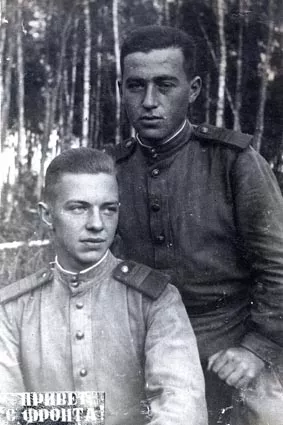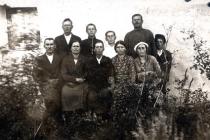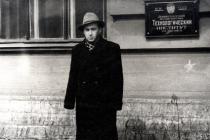This photograph was taken in Narva in 1943. Here I’d like to tell you about my war.
In the morning of January 13, 1944 artillery preparation fire was started. I never saw such number of military weapons and equipment. They roared so loudly that I could not hear my voice. During 3 hours everything around us was booming and burning. Pandemonium! We went forward and found out with great surprise that we met with no resistance. We stopped trying to understand the reason. And we saw only bodies of German soldiers torn to ribbons - and that was all. The first armed conflict happened about 10 kilometers farther (near the Koporye village). There was an ancient castle occupied by Germans. Our commanders ordered not to shoot at the castle in order to keep it undamaged. Certainly we managed to dislodge the enemy, but suffered heavy losses. I was also impressed much by the cemetery of German military equipment. By the way, I often deliver lectures at schools. I like to tell schoolchildren about the war I participated in. I noticed that boys and girls frequently consider our allies to be the winners (not us!). Therefore I told them how often I saw twisted wreckage of English and American tanks we received according to lend-lease. [Lend-lease was a system of loaning or renting arms, ammunition, strategic raw material, foodstuffs, goods and services to countries - allies.]
Those tanks were very bad: bulky and slow. When I saw our tank T-34 for the first time I felt pride in it. [The T-34 was a Soviet medium tank considered to be the best one on the front lines of the WWII.] Airplanes of our allies were so-so, too. In general, I think that by the end of the war our army was armed and organized so well that we could reach Gibraltar if they did not stop us on Elba.
Here I am back to my narration. From Koporye we advanced with fights through Pskov, Gdov and Slantsy. Up to Narva we were not bad, but later everything became hard. Narva River had got a slight and a slope banks. Germans occupied the slope one. We had to force a crossing over the Narva River suffering heavy losses, but after that we chased Germans up to Tallin. There Germans fortified their position again and again we had to start heavy fights.
Here I'll tell you about one incident which happened to me near the Narva River. You see I had several photographs of my relatives (the dearest ones) with me and kept them in the breast pocket of my soldier's blouse. The equipment I worked with required accumulators, so we always held them in stock. One day we came short of accumulators and I (together with a group of support) went to the charging station. I made our way along the Narva River. A member of our group suggested to move on the ice, because the road was occupied by moving armies. Well, we started, but the front part of the lorry fell into the scour (fortunately only the bumper went down). We managed to jump out, but certainly got wet through. By the way, it was very cold: 20 degrees centigrade below zero. We started shooting in the air. Soldiers ran up and brought us to the hospital, where nurses (young girls) stripped us naked, took methyl alcohol, worked it in and gave us some spirit to drink. In the morning we felt having no cold, but a part of my photos got slightly wet. Later I got to know that all photos of our family burned down together with our house in Olgino.
Near Narva we had got a small territory (about 20 square kilometers) under our control. We were surrounded by Germans, and received foodstuffs parachuted from airplanes. About a month we ate millet and American slab bacon. I remember myself going to my unit, watching girls in soldiers' blouses dancing and listening to accordion. Sometimes I danced too, and then did not sleep at night: I tried to imagine my future peace life.















